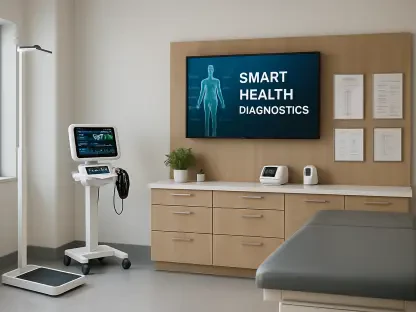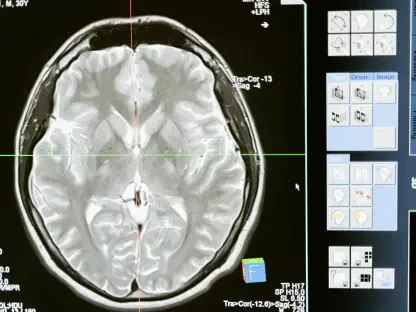In an era where personalized medicine holds the promise of revolutionizing healthcare, the security of sensitive genomic data has emerged as a critical concern for the biotech industry, with recent findings from a comprehensive security posture report revealing startling vulnerabilities in the systems that handle this highly personal information. With attackers able to gain unauthorized access to DNA records and health data in under two hours, the stakes couldn’t be higher. Trust, a cornerstone of this sector, hangs in the balance as fundamental security flaws threaten not only individual privacy but also the broader adoption of innovative medical solutions. This alarming reality demands a closer look at the systemic issues plaguing biotech platforms and the urgent steps needed to safeguard invaluable data against malicious exploitation.
Uncovering the Security Gaps in Biotech Platforms
Exposing Vulnerabilities Through APIs and System Leaks
A deep dive into the security landscape of biotech firms uncovers a troubling pattern of easily exploitable weaknesses, with Application Programming Interfaces (APIs) standing out as a primary concern. Accounting for 34% of identified issues, many API endpoints lack proper authentication, openly exposing patient IDs, genetic reports, and even partner data to unauthorized access. Compounding this problem, publicly available developer documentation, such as Swagger and GraphQL introspection, offers attackers a clear roadmap to navigate and exploit these systems. Beyond APIs, over half of the surveyed companies inadvertently reveal internal system details through verbose error messages and exposed configuration files. Non-minified JavaScript code often contains hardcoded secrets like API keys, drastically lowering the barrier for malicious actors to identify and leverage critical flaws. These lapses in basic security hygiene paint a concerning picture of an industry struggling to protect its most sensitive assets from even rudimentary attacks.
The ramifications of such exposures extend far beyond technical failures, posing significant risks to both operational integrity and regulatory compliance. When internal usernames, file paths, and other sensitive details are laid bare through simple reconnaissance, the effort required for a breach diminishes considerably. This vulnerability is not just a theoretical risk but a practical one, as demonstrated by the speed with which attackers can pivot from passive observation to accessing live data. The biotech sector, entrusted with genomic information that defines individual identities, cannot afford to overlook these foundational issues. Failure to address them could lead to breaches that not only compromise personal privacy but also trigger severe penalties under frameworks like HIPAA and GDPR. As the industry races to innovate, ensuring robust protection mechanisms for APIs and system configurations must become a non-negotiable priority to maintain public confidence and legal standing.
Credential Exposure and Outdated Software Risks
Another glaring issue in biotech security is the widespread availability of corporate credentials, with 36% of companies having email-password pairs tied to their domains exposed through third-party breaches and stealer logs. This exposure often stems from credential reuse, a practice that heightens the risk of credential stuffing and account takeovers. Such lapses in identity management create easy entry points for attackers, who can exploit these compromised credentials to infiltrate systems handling sensitive genomic data. The problem is exacerbated by the lack of robust authentication measures, leaving critical accounts vulnerable to unauthorized access. This pervasive issue underscores a broader failure to enforce strict credential policies and monitoring, placing immense pressure on companies to overhaul their approach to user authentication and protect against breaches that could have devastating consequences for both individuals and organizations.
Equally concerning is the prevalence of outdated software and unpatched systems within the biotech sector, reflecting significant gaps in asset inventory and vulnerability management. Many firms continue to operate on versions of software like Apache HTTP Server and PHP that contain known vulnerabilities, alongside third-party libraries that have not been updated to address critical flaws. Publicly accessible development environments, often reusing production credentials without adequate access controls, further compound these risks by serving as gateways for attackers. The persistence of such outdated infrastructure highlights a systemic neglect of routine maintenance and patching, leaving systems exposed to exploits that could be prevented with basic diligence. Addressing these shortcomings requires a concerted effort to prioritize software updates and secure development environments, ensuring that the technological backbone of the industry is not a liability but a bastion of trust and reliability.
Addressing the Path Forward for Biotech Security
Strengthening Fundamental Security Practices
Turning the tide on biotech security demands a return to fundamental practices that can significantly mitigate the risks of data exposure. Implementing robust authentication protocols, such as multi-factor authentication (MFA), stands as a critical first step to prevent unauthorized access to sensitive systems. Regular patching of software and timely updates to third-party libraries must become standard operating procedures to close known vulnerabilities before they can be exploited. Additionally, restricting access to development environments and ensuring that production credentials are never reused in testing scenarios can eliminate easy entry points for attackers. These measures, while basic, are essential to building a resilient security framework that protects genomic data from the growing sophistication of cyber threats. Without such foundational steps, the industry risks not only operational disruptions but also irreparable damage to its reputation.
Beyond these initial measures, biotech companies must invest in comprehensive security audits to identify and address hidden vulnerabilities within their systems. This includes scrutinizing API configurations to ensure that endpoints are properly secured and that no sensitive information is inadvertently exposed through public documentation. Training employees on secure credential management and the dangers of reuse can further reduce the likelihood of compromised accounts being leveraged for breaches. The urgency of these actions cannot be overstated, as the consequences of inaction could undermine the very promise of personalized medicine. By embedding security into every facet of their operations, from development to deployment, firms can begin to rebuild trust with patients, regulators, and investors. The path forward hinges on a proactive commitment to safeguarding data as zealously as the industry pursues innovation.
Learning From Past Breaches to Build Trust
Reflecting on past incidents provides a sobering reminder of the stakes involved in biotech security. High-profile breaches, such as the one experienced by 23andMe, exposed how seemingly minor oversights—like the absence of mandatory multi-factor authentication or poorly managed consent defaults—could amplify the impact of security lapses. These events not only compromised sensitive genomic data but also shook public confidence in the industry’s ability to protect personal information. The fallout from such incidents often extended to regulatory scrutiny and financial repercussions, highlighting the need for preemptive action. Looking back, it became evident that many of these breaches could have been mitigated with stronger controls and a culture of security awareness that prioritized data protection over convenience.
Moving forward, the biotech sector must translate these lessons into actionable strategies to fortify its defenses. Establishing industry-wide standards for security practices, coupled with regular third-party assessments, could help ensure consistent protection across the board. Collaboration between companies, regulators, and cybersecurity experts might foster the development of innovative solutions tailored to the unique challenges of handling genomic data. Emphasizing transparency in how data is secured and responding swiftly to any incidents can also play a vital role in restoring trust. As the industry reflects on past shortcomings, the focus shifts to creating a future where security and innovation coexist, ensuring that the transformative potential of personalized medicine is not derailed by preventable failures.









